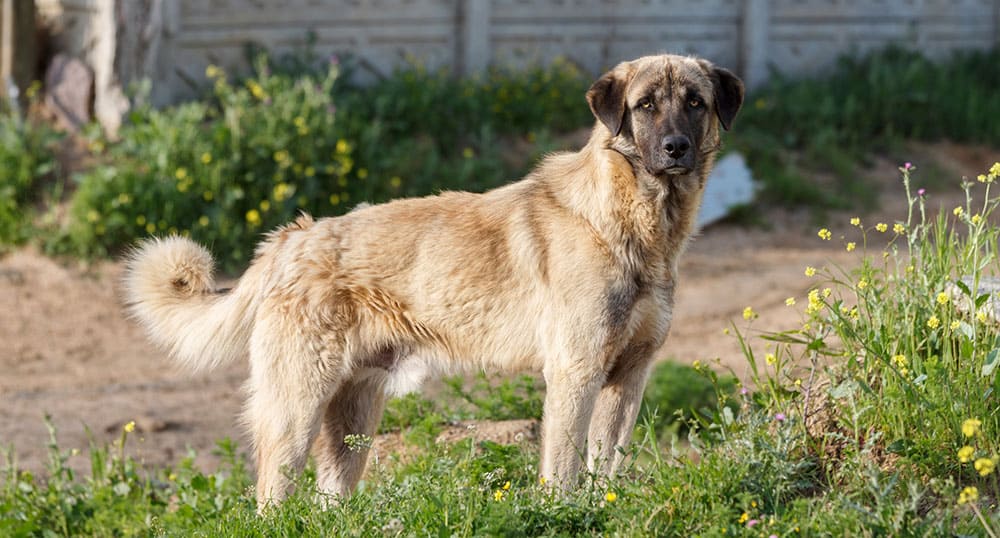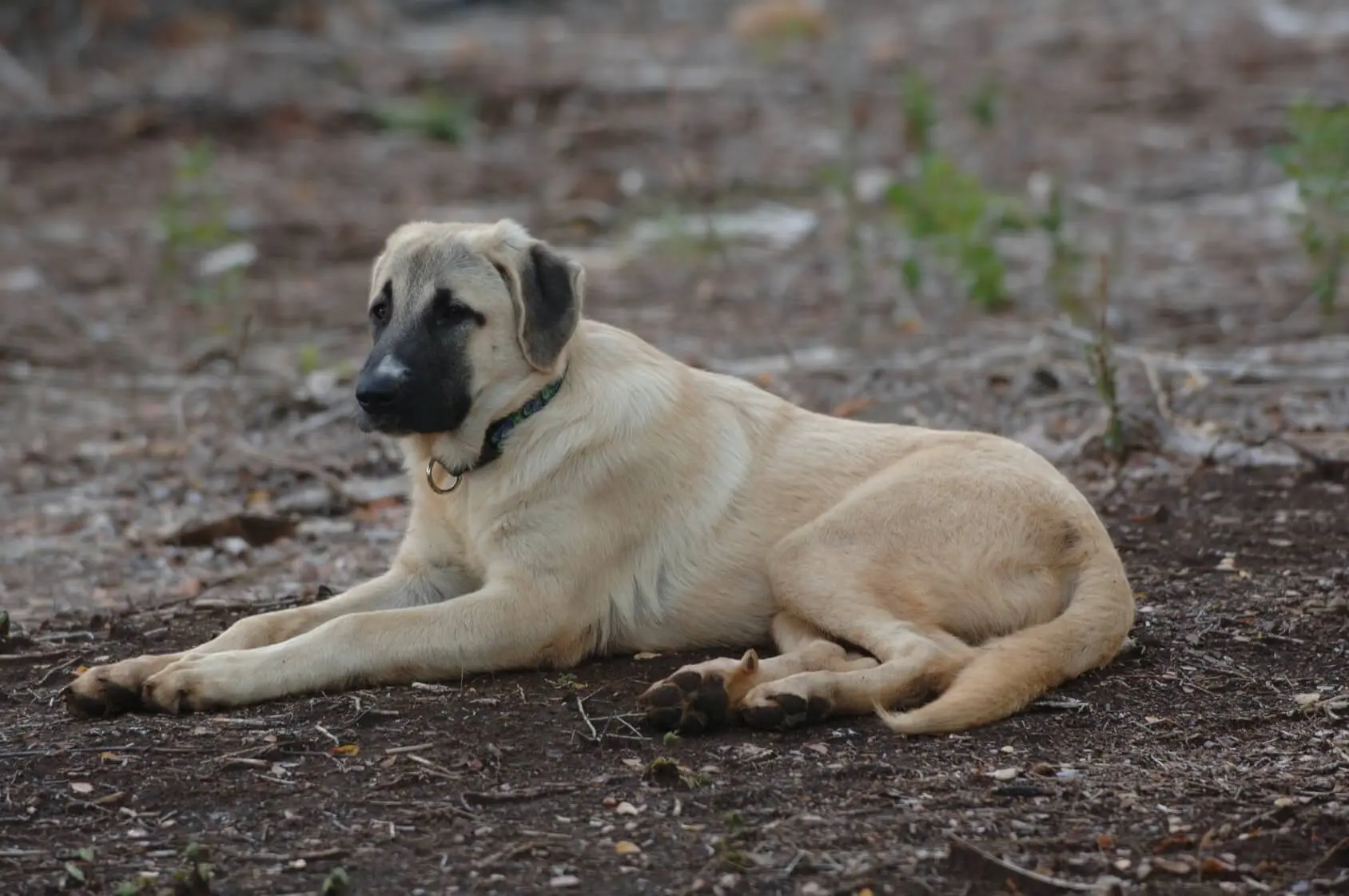Anatolian Shepherds, renowned for their impressive size and robust appearance, have carved a niche as exceptional guard dogs. In the realm of home security, these majestic creatures stand out for their natural instincts and unwavering loyalty. Let's delve into what makes Anatolian Shepherds an excellent choice for those seeking a reliable and efficient guard dog.

Characteristics of Anatolian Shepherds:
Anatolian Shepherds, a breed originating from the Anatolian region of Turkey, possess distinctive characteristics that make them exceptional guard dogs. Understanding these traits is vital for those considering Anatolian Shepherds as their guardians.
One of the most noticeable characteristics of Anatolian Shepherds is their impressive size and commanding appearance. These happy dogs are large and well-muscled, presenting a formidable deterrent to potential intruders. Their thick double coat adds to their imposing presence, making them visually striking and well-suited for their role as guard dogs.
Anatolian Shepherds exhibit a unique temperament characterized by a blend of calmness and vigilance. While they are known for their gentle and affectionate nature, they possess an innate alertness that triggers when they sense a potential threat. This balanced temperament allows them to be both loving family companions and effective guard dogs.

Intelligence is a hallmark of Anatolian Shepherds. Their ability to quickly assess situations and make informed decisions contributes to their effectiveness as guard dogs. This intelligence is a valuable trait during training, as Anatolian Shepherds can grasp commands and tasks with relative ease.
Natural Guarding Instincts
The natural guarding instincts of Anatolian Shepherds are deeply rooted in their history as livestock guardians in the Anatolian region. These instincts have been honed over centuries, making them instinctual protectors of their territory and those within it.
Anatolian Shepherds have a rich history of serving as guardians for livestock. This historical role required them to protect herds from predators, and this instinctual behavior has been passed down through generations. The heritage of guarding livestock contributes to their natural instincts to safeguard their home and family.
Territorial behavior is a key component of Anatolian Shepherds' natural guarding instincts. They develop a strong attachment to their living space, considering it their territory to protect. This territoriality manifests in a heightened sense of awareness and readiness to defend against perceived threats.
Training Anatolian Shepherds as Guard Dogs
While Anatolian Shepherds possess innate guarding instincts, proper training is essential to channel these instincts effectively. Training ensures that their protective behaviors align with the needs of modern households, striking a balance between security and sociability.
Obedience Training:
Obedience training is fundamental for Anatolian Shepherds. Establishing a clear hierarchy and teaching basic commands lays the groundwork for a well-disciplined guard dog. This training not only enhances their responsiveness to commands but also fosters a strong bond between the dog and its owner.
Socialization:
Socialization plays a crucial role in ensuring Anatolian Shepherds are comfortable and well-behaved in various social settings. Exposing them to different people, environments, and situations from an early age helps prevent excessive shyness or aggression. A well-socialized Anatolian Shepherd is more adaptable and less likely to exhibit unwarranted guarding behavior.
Guard Commands:
Specific guard commands are vital for directing Anatolian Shepherds' protective instincts. Teaching commands such as "guard," "watch," or "alert" helps them distinguish between normal activities and potential threats. Consistent reinforcement of these commands strengthens their role as effective guard dogs.
Perplexity in Guarding Situations
Anatolian Shepherds exhibit a high level of perplexity in various guarding situations. This ability to adapt and navigate complex scenarios makes them versatile guard dogs capable of handling diverse environments and challenges.
Adapting to Various Environments:
One of the key features of Anatolian Shepherds is their adaptability to different environments. Whether in a rural setting guarding a farm or in a suburban home, these dogs showcase a level of perplexity that allows them to understand and respond to the specific challenges of each situation. This adaptability ensures their effectiveness as guard dogs in a variety of living conditions.
Handling Unexpected Challenges:
Perplexity also manifests in Anatolian Shepherds' capacity to handle unexpected challenges. Guarding situations are not always predictable, and these dogs demonstrate a keen ability to assess and respond to unforeseen circumstances. Whether facing unfamiliar sounds, sudden movements, or other unexpected stimuli, Anatolian Shepherds maintain a high level of alertness and readiness.
Burstiness in Protective Actions
Anatolian Shepherds are characterized by the burstiness of their protective actions. This burstiness, marked by quick and decisive responses, is a testament to their readiness to spring into action when the need arises.
Quick Response to Threats:
The quick response of Anatolian Shepherds to perceived threats sets them apart as guard dogs. Their acute senses and sharp instincts allow them to detect potential dangers swiftly. This quick response is crucial in deterring intruders and ensuring the safety of the protected space and its inhabitants.
Agility and Alertness:
Burstiness in protective actions also involves agility and alertness. Anatolian Shepherds are not only quick to react but also agile in their movements. Their alert stance and rapid responses contribute to their effectiveness in deterring and confronting potential threats. This combination of burstiness, agility, and alertness makes Anatolian Shepherds formidable guardians.
Specificity in Guarding Tasks
Anatolian Shepherds exhibit a remarkable level of specificity in their guarding tasks, distinguishing between routine activities and potential threats. This discerning nature contributes to their effectiveness as guard dogs while ensuring a balanced and controlled approach to their protective duties.
Focusing on Protecting Property:
One aspect of the specificity in Anatolian Shepherds' guarding tasks is their focus on protecting property. These dogs understand the boundaries of their territory and prioritize safeguarding it against intruders. Their natural inclination to differentiate between normal activities and potential threats minimizes the risk of unnecessary aggression while maintaining a vigilant watch over the protected space.
Recognizing Family Members:
In addition to safeguarding property, Anatolian Shepherds demonstrate specificity in recognizing family members. Their protective instincts extend to those within their social unit, ensuring that they can distinguish between familiar faces and potential intruders. This ability to recognize and differentiate individuals adds an extra layer of personalized security, making them reliable guardians for families.

Contextual Guarding
Contextual guarding is a distinctive trait of Anatolian Shepherds, showcasing their ability to understand and adapt to different settings. This contextual awareness enhances their effectiveness as guard dogs in various environments and situations.
Understanding Different Settings:
Anatolian Shepherds excel in understanding the nuances of different settings. Whether placed in a bustling urban environment or a quiet suburban neighborhood, these dogs adapt their guarding behaviors accordingly. This contextual awareness allows them to navigate diverse surroundings while maintaining a consistent level of vigilance.
Balancing Vigilance and Relaxation:
Contextual guarding also involves the ability to balance vigilance with relaxation. Anatolian Shepherds are not in a perpetual state of high alert; instead, they adjust their level of vigilance based on the context. This balanced approach ensures that they can effectively switch between guarding duties and moments of relaxation, contributing to a harmonious coexistence with their human companions.
The Anatolian Shepherd as a Family Pet
Beyond their role as guard dogs, Anatolian Shepherds have qualities that make them suitable and loving family pets. Contrary to the misconception that guard dogs are incompatible with family life, Anatolian Shepherds seamlessly integrate into households, offering both protection and companionship.
Compatibility with Children:
Anatolian Shepherds exhibit a gentle and affectionate nature, making them compatible with children. Their protective instincts extend to the youngest members of the family, creating a bond based on trust and loyalty. With proper socialization, these dogs become reliable and loving companions for children, contributing to a positive family dynamic.
Integration into Family Life:
The adaptability of Anatolian Shepherds extends to their integration into family life. While they are vigilant guardians, they also thrive on being part of a social unit. Inclusion in family activities, regular interactions, and positive reinforcement foster a strong bond between the dog and its human family members. This integration ensures that Anatolian Shepherds contribute not only to home security but also to the overall well-being and happiness of the family.
Common Misconceptions about Anatolian Shepherds
Despite their well-established reputation as excellent guard dogs and family pets, Anatolian Shepherds are subject to certain misconceptions. Clarifying these misconceptions is essential for potential owners to make informed decisions about bringing these remarkable dogs into their homes.
Aggression vs. Protective Instincts:
One prevalent misconception about Anatolian Shepherds is the confusion between aggression and protective instincts. These dogs have a strong natural inclination to protect their territory and loved ones, which can be misconstrued as aggression. Understanding the distinction is crucial; Anatolian Shepherds, when properly trained and socialized, exhibit controlled and purposeful protective behavior without unnecessary aggression.
Training Myths:
Another misconception revolves around the belief that Anatolian Shepherds are difficult to train. While they possess independent and intelligent traits, consistent and positive reinforcement methods can yield successful training outcomes. Dispelling the myth of training difficulty emphasizes the importance of patient, firm, and reward-based training techniques.
Choosing an Anatolian Shepherd as Your Guard Dog
Selecting a guard dog requires careful consideration, and choosing an Anatolian Shepherd involves understanding their unique characteristics and the responsibilities of ownership.
Considerations for Prospective Owners:
Prospective owners must consider various factors before choosing an Anatolian Shepherd as their guard dog. These considerations include:
- Space Requirements: Anatolian Shepherds thrive in spacious environments, making them better suited to homes with yards rather than apartments.
- Training Commitment: The training needs of Anatolian Shepherds are significant. Prospective owners should be committed to providing consistent training, socialization, and positive reinforcement.
- Guardian Instincts: Understanding the breed's natural guarding instincts is crucial. Prospective owners should be prepared for a dog that takes its guarding responsibilities seriously.
Finding Reputable Breeders:
To ensure a positive experience with an Anatolian Shepherd, finding a reputable breeder is paramount. Reputable breeders prioritize the health and well-being of their dogs, conduct proper health screenings, and provide a supportive environment for the puppies' early development. Researching breeders, checking reviews, and visiting facilities can help prospective owners make informed decisions.
Maintaining Anatolian Shepherds' Well-being
Maintaining the well-being of Anatolian Shepherds involves a holistic approach that addresses their physical, mental, and emotional needs.

Proper Nutrition:
Providing a balanced and nutritious diet is essential for the overall health of Anatolian Shepherds. High-quality dog food, appropriate portion sizes, and regular feeding schedules contribute to their well-being. Consultation with a veterinarian can help determine the best dietary plan based on individual health requirements.
Regular Exercise:
Anatolian Shepherds are an active breed that requires regular exercise to maintain physical health and prevent boredom-related behavioral issues. Daily walks, playtime, and engaging activities cater to their energetic nature and contribute to a content and well-exercised dog.
Veterinary Care:
Regular veterinary check-ups are vital for monitoring the health of Anatolian Shepherds. Vaccinations, preventive treatments, and early detection of potential health issues ensure a longer and healthier life. Owners should establish a consistent schedule for veterinary visits and address any concerns promptly.
Community Engagement
Anatolian Shepherds not only excel as individual guardians but also have the potential to actively contribute to community engagement, fostering a sense of security and cooperation among neighbors.
Anatolian Shepherds in Neighborhood Watch Programs:
Harnessing the protective instincts of Anatolian Shepherds, communities can benefit from including these dogs in neighborhood watch programs. Their presence alone can act as a deterrent to criminal activity, enhancing the overall safety of the community. Collaborative efforts that involve responsible Anatolian Shepherd ownership contribute to a collective sense of security.
Building Positive Relationships:
Community engagement extends beyond the protective role of Anatolian Shepherds. Responsible owners play a crucial role in building positive relationships with neighbors. Open communication, introducing neighbors to the dog, and addressing any concerns proactively can create an environment where Anatolian Shepherds are seen not only as guardians but also as valued members of the community.

Conclusion
In conclusion, Anatolian Shepherds stand out as exceptional guard dogs, combining historical instincts with adaptability, specificity in their protective actions, and a unique blend of burstiness and contextual awareness. Their roles as family pets further emphasize their versatility, showcasing a balance between protection and companionship.
It's essential for prospective owners to dispel common misconceptions, understanding that Anatolian Shepherds' protective instincts are rooted in a desire to safeguard rather than display aggression. The training process, when approached with patience and positive reinforcement, unlocks the full potential of these remarkable dogs.
Choosing an Anatolian Shepherd involves thoughtful consideration, recognizing the commitment required for training and the space needed for their well-being. Reputable breeders play a crucial role in ensuring the health and positive development of Anatolian Shepherds, emphasizing the responsibility of selecting a breeder carefully.
Maintaining the well-being of Anatolian Shepherds involves proper nutrition, regular exercise, and attentive veterinary care. These elements contribute not only to their physical health but also to their mental and emotional fulfillment.
Community engagement introduces Anatolian Shepherds to neighborhood watch programs, highlighting their potential as contributors to overall community safety. Responsible ownership, positive relationships with neighbors, and open communication foster a harmonious coexistence between Anatolian Shepherds and the community.
In considering Anatolian Shepherds as guard dogs and family companions, responsible ownership is paramount. These remarkable dogs, when cared for with dedication and understanding, become not only protectors of homes but cherished members of the family, enriching the lives of those fortunate enough to share their homes with them.
Frequently Asked Questions (FAQs)
- Are Anatolian Shepherds aggressive?
- While Anatolian Shepherds have strong protective instincts, they are not inherently aggressive. Proper training and socialization help them express their guarding behavior appropriately.
- Can Anatolian Shepherds be kept in apartments?
- Anatolian Shepherds thrive in spacious environments, ideally with a yard. However, with regular exercise and mental stimulation, they can adapt to apartment living, provided their needs are met.
- Do Anatolian Shepherds get along with other pets?
- With early socialization, Anatolian Shepherds can coexist with other pets. Their guardian instincts may make them protective, so introducing them to other animals gradually is key.
- How do I find a reputable Anatolian Shepherd breeder?
- Research carefully, read reviews, and ask for referrals. Reputable breeders prioritize the health and well-being of their dogs, conducting proper health screenings and creating a positive environment.
- What is the lifespan of an Anatolian Shepherd?
- On average, Anatolian Shepherds live between 11 to 15 years. Proper care, nutrition, and attention to their health needs contribute to a longer and healthier life.




